Port Talbot: First of two blast furnaces shuts down

By Huw Thomas, Business Correspondent, BBC Wales News
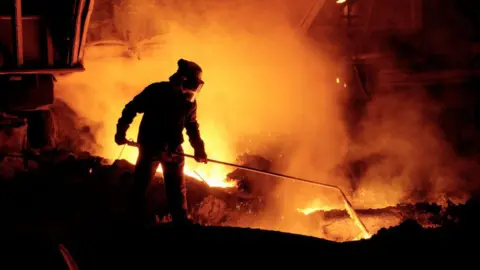 Construction Photography/Avalon
Construction Photography/AvalonLoud noises and large plumes of steam will be visible above the Port Talbot steelworks as one of its historic furnaces is closed down by Friday.
Blast Furnace 5 (BF5) had been operating since 1959, but will shut as part of Tata Steel UK’s restructure.
Port Talbot’s other furnace will end production of liquid iron in September ahead of the construction of a greener electric arc furnace next year.
Nearby residents have been warned about the sights and sounds connected to the cooling of BF5.
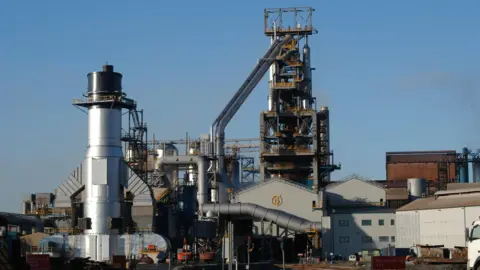 Tata Steel UK
Tata Steel UK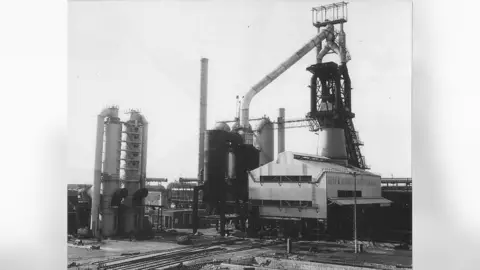 Tata Steel UK
Tata Steel UKEarlier this week, engineers began altering the raw ingredients that are poured into the blast furnace in order to prepare for decommissioning.
Plumes of steam and some whooshing sounds were expected to be heard ahead of the final tapping of liquid iron on Thursday evening or Friday morning.
When the furnace began life in May 1959, it produced 11,800 tonnes a week, peaking in 2009 when it was producing more than 57,000 tonnes a week.
Tragedy struck in November 2001 when an explosion killed three steelworkers and severely injured 12 others.
Tonnes of molten iron burst from the furnace as the explosion lifted the top of the massive structure into the air.
A report blamed the cause of the disaster on water that had come into contact with hot materials in the furnace.
 Family photos
Family photosThe explosion claimed the lives of Stephen Galsworthy, who was 25, Andrew Hutin, 20, and Len Radford, 53.
A £65m rebuilding of the furnace, and upgrades since, had allowed it to continue producing the liquid iron required for Port Talbot’s steelworks.
Its closure comes amid a vast restructure of Tata Steel UK’s operations.
While BF5 will close this week, Blast Furnace 4 will shut in September and will end Port Talbot’s ability to produce liquid iron from ore.
Around 2,800 staff from Tata’s 8,000 workforce will lose their jobs.
History of Blast Furnace 5
- May 1959 – The hearth for Blast Furnace 5 is “blown-in” to begin producing molten iron
- 1960 – BF5 is producing 11,800 tonnes a week, and is one of 27 blast furnaces in the UK
- 1973-74 – BF5 is relined and enlarged, producing 23,000 tonnes a week
- November 2001 – Explosion that killed three men
- 2002 – £65m rebuilding of the damaged furnace
- 2009 – Iron production hits a record of 57,249 tonnes a week
- 2018 – Life extension project to keep the furnace running until 2026
- 2024 – Tata Steel announces it will close both BF5 and the younger BF4 this year
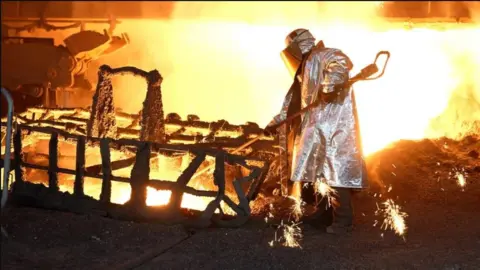
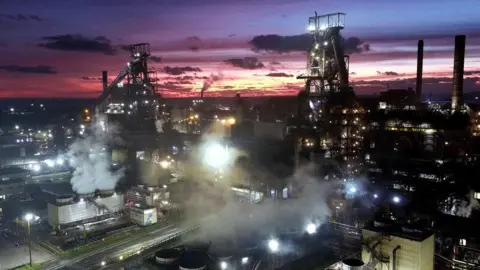 Tata Steel UK
Tata Steel UKThe company has said that Port Talbot’s blast furnace operation was incurring losses of £1m a day and was financially unsustainable.
It is also the largest polluter in Wales. The blast furnaces emit around two tonnes of carbon dioxide for every tonne of steel they produce.
It is estimated that Wales’ overall emissions will be cut by 15 to 20% with the closure of the furnaces.
The company will build an electric arc furnace to produce steel by melting scrap metal, with construction set to begin in August 2025.
The process will take several years to complete, and will require far fewer jobs to operate than the traditional blast furnaces.
Related
Youth football teams hold minute’s silence for 10-year-old Poppy Atkinson
Youth football teams and grassroots clubs across the country have held a minute’s silence at the start of their games to commemorate a 10-year-old girl who di
Girl’s death sparks minute’s silence at football matches nationwide
10-year-old Poppy Atkinson was killed when she was struck by a car during a training session at Kendal Rugby Club in Cumbria. Clubs from Leeds to London
Liverpool fans’ Uefa claim can be heard in England, judge…
The high court, sitting in Liverpool, heard Uefa had relied upon the principle that English courts will not inquire into the legality of actions by foreign gove
Alan Shearer’s Premier League predictions including Manchester United vs Arsenal
Caption: Alan Shearer?s Premier League predictions credit: Getty / Metro After some impressive results for English sides in Europe the focus is













